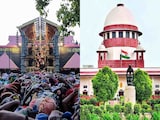Coronavirus Vaccine Dry Run: The Health Minister will monitor the drive in Delhi. (Representational)
A dry run to check the best way to vaccinate people against COVID-19 and plug loopholes in logistics and training has started in all the states today. This day-long drive will also test the operational feasibility in the use of CoWIN application in a field environment. Short for Covid Vaccine Intelligence Network, CoWIN is a digital platform to roll out and scale up the vaccination drive. The massive exercise comes a day after a panel of government-appointed experts recommended approval for the Oxford COVID-19 vaccine, manufactured by Serum Institute of India, to the regulator Drugs Control Authority of India. Today's exercise is the second dry run being conducted in the country - the first was on December 28 and 29 in Assam, Andhra Pradesh, Punjab and Gujarat.
- Health Minister Dr Harsh Vardhan this morning said there should be no misconceptions about the safety of the coronavirus vaccine that India plans to use. "Everything has been checked in detail. Initially when the polio vaccine was rolled out, even then rumours had floated," he said as he visited Delhi's GTB hospital to review the dry run. The feedback from dry run in four states earlier this week has been used to improve the government's 150-page training guidelines, he said.
- The government has been preparing for the vaccine rollout for the last four months, the Health Minister said today, adding that attention has been paid to the minutest of the details. "The drug regulator - DCGI - will soon take a decision about the recommendation of the vaccines," he added. Across India, the dry run is being conducted in in 116 districts across 259 sites. Some 96,000 vaccinators have been trained for this, the Health Ministry had said.
- Twenty-five health workers receive dummy vaccines at each spot as part of the dry run, which is meant to test the mechanisms and reveal possible gaps in the system ahead of the actual vaccination drive. "An important focus of the dry run will be on management of any possible adverse events following immunization," the Health Ministry said in a statement. On Friday, Dr Harsh Vardhan had compared the dry run to conducting elections.
- In Delhi, the dry run is being conducted in Guru Teg Bahadur Hospital in Shahdara, urban primary health centre in Daryaganj and Venkateshwar Hospital in Dwarka. In Bengaluru, the drive is being carried out at three centres. "The main intention of the dry run is to check if there are any loopholes," Medical Officer Dr Madhusudhan told NDTV at one of the centres. "'Just like elections, each person's identity will be verified. Once checked, he or she will go to the vaccination room," he added.
- In Lucknow, the dry run is being held at six places. In Pune, it is be held in three healthcare centres, apart from Nagpur, Jalna, and Nandurbar. Chhattisgarh is holding the dry run at seven districts. The day-long drive will be carried out in four districts in Gujarat. Punjab is conducting the dry run in Patiala, and Haryana is carrying out the exercise in Panchkula.
- In Kerala, the dry run is being held in four districts - Thiruvananthapuram, Idukki, Wayanad and Palakkad. "Everything went smoothly," state's Health Minister KK Shailaja said after reviewing dru run at a government hospital.
- India is awaiting vaccination for COVID-19 and it will start anytime soon after the regulator DCGI approves a vaccine. The Serum Institute of India (SII) is making the vaccine Covishield developed by Oxford University and pharma major AstraZeneca, while Bharat Biotech has partnered with the Indian Council of Medical Research (ICMR) for its Covaxin.
- On how much would the vaccine cost and who will pay for it, AIIMS Director Dr Randeep Guleria told NDTV, "Currently, the vaccine cost is supported by the government, so this will be something which will be done as part of government initiative as any other vaccine programme, I don't think it's going to cost anything."
- Cheaper and easier to distribute than rival shots, the AstraZeneca-Oxford vaccine could be a game-changer for global immunisation. Countries with relatively basic health infrastructure have high hopes for a shot that, unlike Pfizer's, can be stored and transported under normal refrigeration, rather than super-cooled to -70 degree Celsius.
- Britain became the first country this week to authorise the AstraZeneca vaccine, moving ahead of other western countries as it seeks to stem a record surge of infections driven by a highly contagious form of the virus that has also surfaced in India.















